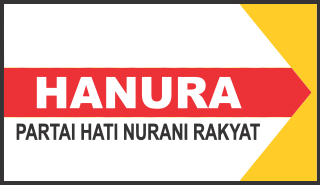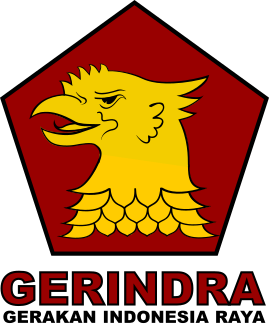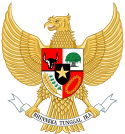
The Indonesian Democratic Party of Struggle is an Indonesian political party, and the party of the current President of Indonesia, Joko Widodo.

The United Development Party is an Islam-based political party in Indonesia. Due to its distinctive logo, the party is nicknamed "Kaaba Party".
The National Awakening Party, frequently abbreviated to PKB, is an Islam-based political party in Indonesia.

Elections in Indonesia have taken place since 1955 to elect a legislature. At a national level, Indonesian people did not elect a head of state – the president – until 2004. Since then, the president is elected for a five-year term, as are the 560-member People's Representative Council and the 128-seat Regional Representative Council.

The Prosperous Justice Party, frequently abbreviated to PKS, is an Islam-based political party in Indonesia.

The National Mandate Party, frequently abbreviated to PAN, is an Islam-based political party in Indonesia.

The Crescent Star Party is a political party in Indonesia.
The Indonesian Justice and Unity Party is a political party in Indonesia.

Indonesia's second legislative election, and the first under the New Order regime, was held on 3 July 1971. There were 10 participants; 9 political parties and the "functional group" Golkar.

Indonesia's third legislative election, and the second under the New Order regime, was held on 2 May 1977. There were three participants; the two political parties and functional groups Golkar.

Indonesia's fifth legislative election, and the fourth under the New Order government, was held on 23 April 1987. There were three participants; the two political parties and the "functional group" Golkar. Like all the New Order elections, it was an outright victory for Golkar.

Indonesia's sixth legislative election, and the fifth under the New Order regime, was held on 9 June 1992. Although the share of the vote won by Golkar declined, and the two parties saw their votes rise, the government organisation still won a clear majority.

Constitutional Assembly elections were held in Indonesia on 15 December 1955. The Indonesian Provisional Constitution of 1950 had provided for the establishment of a democratically elected Constitutional Assembly to draw up a permanent constitution. In April 1953 the legislature passed the election bill. The elections for the People's Representative Council were set for September 1955, with the Constitutional Assembly elections three months later.

Legislative elections were held in Indonesia on 9 April 2009 for 132 seats of the Regional Representative Council (DPD) and 560 seats of the People's Representative Council (DPR). A total of 38 parties met the requirements to be allowed to participate in the national elections, with a further six contesting in Aceh only. The Democratic Party of President Susilo Bambang Yudhoyono won the largest share of the vote, followed by the Golkar Party and the Indonesian Democratic Party – Struggle.

The People's Conscience Party is a political party in Indonesia. It was established following a meeting in Jakarta on 13–14 December 2006 and first headed by former Indonesian National Armed Forces commander Wiranto.

The Great Indonesia Movement Party is a political party in Indonesia. In the 2014 presidential election, the party was represented by former Indonesian Army Strategic Reserve Command and Indonesian special forces commander Lieutenant General Prabowo Subianto. Prabowo lost to Joko Widodo in the election, earning 46.85% of the vote to Widodo's 53.15%.

The General Elections Commission is the body that organises elections in Indonesia. Its responsibilities include deciding which parties can contest elections, organising the voting and announcing the results and seats won in the various branches of the government.

The Garuda Party is a political party in Indonesia that will contest the 2019 general election. The party been linked to the family of former president Suharto. Officials have denied the party is linked to the Suharto family or to former general Prabowo Subianto's Gerindra Party.

Local elections were held in Indonesia on 15 February 2017, with a single run-off for Jakarta on 19 April 2017. The series of elections was the second time local elections were held simultaneously across the country after the 2015 local elections. In total, the election contested 7 gubernatorial, 18 mayoral and 76 regent seats with 41 million eligible voters and 337 candidate pairs.














